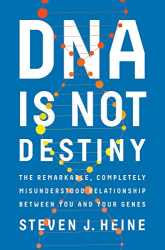|
Getting your Trinity Audio player ready...
|
After the end of World War II, everyone was left wondering what had gone wrong and who or what was to blame.
Simultaneously there was a race going on to find out what made us human.
In 1944 experiments by Oswald Avery, Colin Macleod, and Maclyn McCarty revealed that the molecule passing on genetic information through generations was a nucleic acid. Intensive experiments eventually led to the discovery of the double helix molecular structure of DNA (Deoxyribonucleic Acid) in 1953.
This discovery ushered in the beginning of the genetic age. Crucially DNA began to assume a mythic role in the public imagination. Genes came to be regarded as the source of almost every human behavior, psychological state, and consequently every ill that assails us. This philosophy is often referred to as ‘genetic essentialism—the idea that genes constitute our essence and define our life.
Most Human Genetic Characteristics Are Shared Across the Globe
From there, it has been a very short step to a whole host of mistaken ideas. Genetic essentialism led some commentators to suppose incorrectly that German genes were responsible for World War I and II. German genes are, in fact, little different from British genes, African genes, or anyone’s genes. Most human genetic characteristics are shared across the globe. Moreover, Germany rapidly became a more peaceful nation after the end of the war, not because of their genes but because they learned from experience.
Among the most damaging ideas of genetic essentialism is the concept that most health issues that plague humanity will ultimately be fixed by editing our genes. On the face of it, this is a very appealing and comforting philosophy. It projects hope for a rosy future, but it is, in fact, one of the most dangerous beliefs ever to enter into the popular lexicon.
This belief is akin to thinking you can open your computer and change a few wires around without altering its functions. DNA faultlessly executes trillions of necessary tasks in our body every day. Altering its code cannot be undertaken without catastrophic consequences. Don’t be surprised if your physiology breaks down just like your rewired computer will.
Most diseases are actually caused or complicated by the choices we make and the experiences we have rather than our allotted genes. We have a measure of control over three factors: food, experience, and behavior. All three are of overwhelming importance to our attempts to control disease. Studies show that five portions of fresh fruit and vegetables a day help prevent cancer, for example. We can choose to follow this.
A Significant Portion of Research is Focused on Which Genes Are Most Associated With Specific Diseases
In contrast, we can’t readily alter our inherited genes. Despite this, a significant portion of Life Sciences research is now focused on the study of which genes are most associated with the occurrence of specific diseases. Popular gene testing companies like 23 and Me, Ancestry, and MyHeritage reinforce genetic essentialism by telling you which diseases you risk developing. For example, there are fifty genes that have been found to be associated with a risk of becoming obese.
These genes are most common among people with European ancestry, but oddly Black Americans and Hispanics are most likely to become obese in the USA. Americans have become one of the world’s most obese populations not because of their genes but because of inequitable social factors, including diet, sedentary lifestyle, economic status, paternal and maternal health choices, and the stresses individuals are exposed to.
Yet a paper Genetics and Obesity, published in August 2022, glosses over these factors in favor of a discussion of possible pharmaceutical interventions that could be developed based on our current knowledge of genetics. The intellectual thrust of this paper is clear, the authors are convinced by their training that genetic modification is the only road ahead worth investigating.
The Life Sciences have come to dominate academia and research funding because the promise of a disease-free life is too alluring to ignore. Yet the idea of a simple genetic injection that guarantees health is a dream unsubstantiated by prior research outcomes. Moreover, these outcomes point to truly severe risks of genetic editing.
It is 70 Years Since DNA Was Discovered
The Life Sciences taken together comprise a vast, sprawling, and hugely profitable enterprise, but that doesn’t make it useful or even safe. It is 70 years since DNA was discovered. Despite this, anyone would struggle to identify specific benefits but find it very easy to uncover problems.
The biotech industry has modified the genes of crops and animals, it has created a host of synthetic food additives and ingredients, and it has transformed the pharmaceutical landscape. America spends more per person on healthcare than any other nation in the world and has become the home of gene-modified products, but in 2014 US longevity started to decrease, slowly at first, but then accelerated during the pandemic.
Step back for a moment and consider what fundamental understanding is missing here. In the physical sciences as you move towards smaller time and distance scales you are progressing from diversity and constant change to unity and stability. Ultimately physicists hypothesize a unified field of matter which sequentially creates time, space, and diversity through a process of self-interaction. Some physicists have realized that the necessary qualities of this unified level of nature’s intelligence are similar to the qualities we attribute to consciousness—wakeful, self-referral, creative qualities.
Is Consciousness the Unified Field?
The unified field remains outside of the rules which govern the manifest universe of space and time. Among these is the second law of thermodynamics—the amount of order in any closed system will inevitably deteriorate over time. In contrast, the unified field is immutable, stable through time, yet simultaneously the source of the structure of space and time. You will perhaps recognize here the role that our consciousness plays in life; our inner identity is stable over time yet organizes everyday life.
DNA is the Physical Counterpart of Our Abstract, Non-material Human Consciousness.
Somehow DNA has succeeded in recreating conditions which bypass the physical law of universal decay, replacing it with evolution. Living systems defy the second law of thermodynamics, just as the unified field is not subject to decay or change. The way in which DNA facilitates this is not understood, but the implications can be readily appreciated.
DNA is not the cause of us falling prey to illness; rather, its structure protects us from illness. The idea that we can edit our genes to prevent illness is fundamentally false; the reverse is true. If we don’t understand how DNA enables living systems to escape decay, how can we possibly edit DNA and its expressions safely?
The pandemic should have brought this home to us all, but sadly genetic essentialism has become a runaway train. The understanding that genes define our physical structure has morphed in the public’s imagination to a useless philosophy of predestined fatalism from which the sole exit is a gene switch.
In a very few well publicised examples, single genetic mutations are solely responsible for particular diseases such as cystic fibrosis or Huntingtons’, but these are exemptions to the general rule that multiple genes are statistically connected with most traits and illnesses. In the vast majority of cases, each gene’s specific influence, its role, it’s relative weighting, and its interaction with other genetic influences remains unknown.
The extent of the complexity becomes clearer when we realize that whilst hundreds of thousands of genes are associated with height, for example, nutrition is actually the best predictor of height. The Dutch are the tallest nation in the world, not because they have special genes but because, for generations, they have been well nourished through their farming expertise.
Environmental pollution, climate, air quality, nutrition, food quality, diversity of diet, lifestyle including exercise, daily routine, housing, social support, education, and economic status collectively play a greater role on average in determining health and longevity than our genes. How we manage ourselves, our family, our society, and the environment are the most significant determinants of health.
The Unintended Consequences of Biotechnology Can be Fatal
However, this does not deter commercial biotechnology interests from seeking to exploit our addiction to genetic essentialism. They are not above creating genetic fears in order to raise funds for research and promote their products. Hiding behind this deceit is a concerning fact; editing any one gene associated with a health vulnerability will inevitably have unintended consequences. Worse, prior research shows these consequences might well be fatal.
Editing of behavior, experience, and food are preventive measures that far outstrip gene editing in effectiveness and safety (genetic modification is not safe or effective). Accordingly, the key to public health lies with education, not biotechnology. Educational approaches are often rejected because it is wrongly believed that individual preferences and habits are impossible to change. On the contrary, there are proven approaches to education that emphasize self-development and self-sufficiency.
The missing element here is consciousness. Systems of meditation have been shown to have benefits for health and educational attainment. These should not be left out of consideration. Technologies of consciousness have played a role in cultural development throughout history. Therefore the design of educational systems should focus on those which assist people to use their conscious capacity wisely. These should be assessed and trialed.
Molecular biologist Dr. John Fagan, has found that regular practice of meditation can alter genetic expression, including:
- Reduced expression of genes involved in the Stress Response
- Reduced expression of genes linked to Inflammation—of importance in reduced incidence and/or severity of heart disease, arthritis, and atherosclerosis.
- 19 genes linked to Cardiovascular Disease are altered in their regulation
- 2 Tumour-Suppressor Genes up-regulated
You can sit up and listen now; meditation not only benefits health, but it might also just enable you to get the best out of your genes without editing them.
In Summary
Genetic experimentation is taking us in a catastrophic direction. It is proliferating exponentially, driven by misplaced funding and government support. We are only just beginning to appreciate the dangers. It needs to be stopped now. It is a dead end.
These findings are discussed in my book Discovering and Defending Your DNA Diet and further elaborated in my essay “Evolution, Genetics, Physics, and Consciousness.”
Guy Hatchard, Ph.D., was formerly a senior manager at Genetic ID, a food testing and certification company (now known as FoodChain ID).
For a comprehensive discussion of Genetic essentialism, read DNA is Not Destiny by Steven J. Heine.
Scientists expect one billion people to have their genomes sequenced by 2025. Yet cultural psychologist Steven J. Heine argues that, in trying to know who we are and where we come from, we’re likely to misinterpret what’s “in our DNA completely.”
Heine’s fresh, surprising conclusions about the promise and limits of genetic engineering and DNA testing upend conventional thinking and reveal a simple, profound truth: your genes create life—but they do not control it.
We are a participant in the Amazon Services LLC Associates Program, an affiliate advertising program designed to provide a means for sites to earn advertising fees by advertising and linking to Amazon.com.





